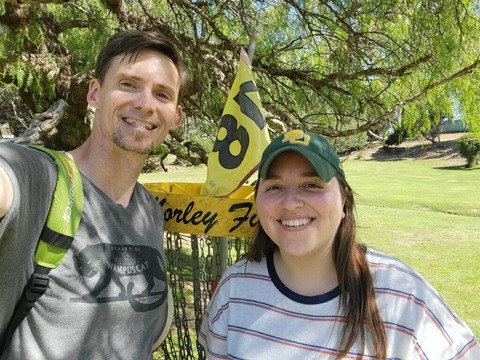Shaping Scholars through Mentorship
Dive into the transformative world of PhD mentoring within the Baylor Graduate School—where personalized guidance and community fuel academic excellence and success.
The Baylor Graduate School is on a mission to redefine the doctoral student experience, and it's doing so by prioritizing mentorship in its PhD programs. With a strong emphasis on personalized guidance and fostering a sense of community, Baylor has long been recognized for its undergraduate student experience (ranked #5 by US News & World Report). Baylor is now looking to make a significant impact by applying that same ethos to the doctoral student experience.
Pursuing a doctoral degree is a journey laden with challenges, including rigorous academic requirements, the balancing of competing priorities, and the pursuit of excellence as scholars. Recognizing these challenges, Baylor’s Graduate School is leading the way in reshaping the PhD student experience through an intentional approach to mentorship.
At the core of the Graduate School’s mission is the belief that mentorship is not just about faculty imparting knowledge to students but a dynamic partnership that fosters personal and professional growth. The mutual relationship between faculty and students is instrumental in nurturing scholars who can thrive in the academic world.
Associate Dean for Professional Development
“We don’t view mentorship as a one-size-fits-all endeavor,” shared Dr. Sara Dolan, Associate Dean for Professional Development in Baylor’s Graduate School. “Instead, we place a strong emphasis on personalization. Each faculty member and doctoral student enter into a mentoring agreement, laying out clear expectations and goals. This agreement ensures that mentorship is tailored to individual needs and aspirations, helping students navigate the challenging journey of a PhD.”
But mentorship at Baylor extends beyond academic guidance, encompassing personal and professional development as well. This holistic approach not only equips students with the skills and knowledge they need for their careers but also supports their personal growth, creating well-rounded scholars fit for human flourishing.
Graduate education thrives in a vibrant academic community. The Baylor Graduate School recognizes this and organizes various activities and events to promote interaction among students and mentors. “We’re beginning to offer more focused workshops, mentoring groups, and other initiatives to provide a vibrant tapestry of support, strengthening the bonds between students and faculty, and enriching the overall graduate education experience,” offered Dolan.
Graduate students at Baylor have shared how mentorship has profoundly influenced their academic journeys and careers.
Dr. Sarah Madsen, a recent PhD graduate of Baylor’s Higher Education Studies and Leadership program, expressed her gratitude for the holistic support her mentor and advisor gave her during—and even after—her time as a student.
“My doctoral advisor, Dr. Nathan Alleman, approached our academic life together as one marked by mutuality, collaboration, and holistic care," said Madsen. "As a result, I grew deeply not only as an emerging scholar and teacher, but also as a member of the university community and as a person of faith. This ‘360 mentoring,’ to use Nathan’s language, was ultimately a gift of wisdom, time, labor, and solidarity, which I hope to repay through my own work with students.”
Similarly, Dr. Burke Leonce, a recent PhD graduate of Baylor’s Geosciences program, shared "Coming in, I expected my advisor, Dr. Bill Hockaday, to be very caring. But I think one of the most influential things was that he allowed me to make my own way. He was there for me whenever I needed him."
"Having mentors like Bill is very important" said Leonce. "The stresses that come with being a PhD student, sometimes—most times actually—they go outside of the academic area. What that means is you need someone who's been through it before. They're sympathetic to the fact that you have a life outside of your research. If you don't have a healthy life outside of your research, you probably won't have healthy research."
Through the guidance and support of their mentors, many students have navigated the uncertainties of a PhD and emerged as successful scholars, ready to make a significant impact in their fields.
By emphasizing personalized mentorship, fostering a sense of community, and providing comprehensive, holistic support, the Baylor Graduate School is setting a new standard in graduate education. This commitment is reshaping the landscape for graduate students, ensuring they are well-prepared for the opportunities that lie ahead.
“Mentorship is at the heart of Baylor Graduate School's mission to transform the doctoral student experience” said Dolan. “The Graduate School’s role in enhancing PhD program mentoring, its dedication to fostering strong relationships, and its commitment to nurturing scholars is making a lasting impact on graduate education.”
ABOUT BAYLOR UNIVERSITY
Baylor University is a private Christian University and a nationally ranked Research 1 institution. The University provides a vibrant campus community for more than 20,000 students by blending interdisciplinary research with an international reputation for educational excellence and a faculty commitment to teaching and scholarship. Chartered in 1845 by the Republic of Texas through the efforts of Baptist pioneers, Baylor is the oldest continually operating University in Texas. Located in Waco, Baylor welcomes students from all 50 states and more than 100 countries to study a broad range of degrees among its 12 nationally recognized academic divisions.

